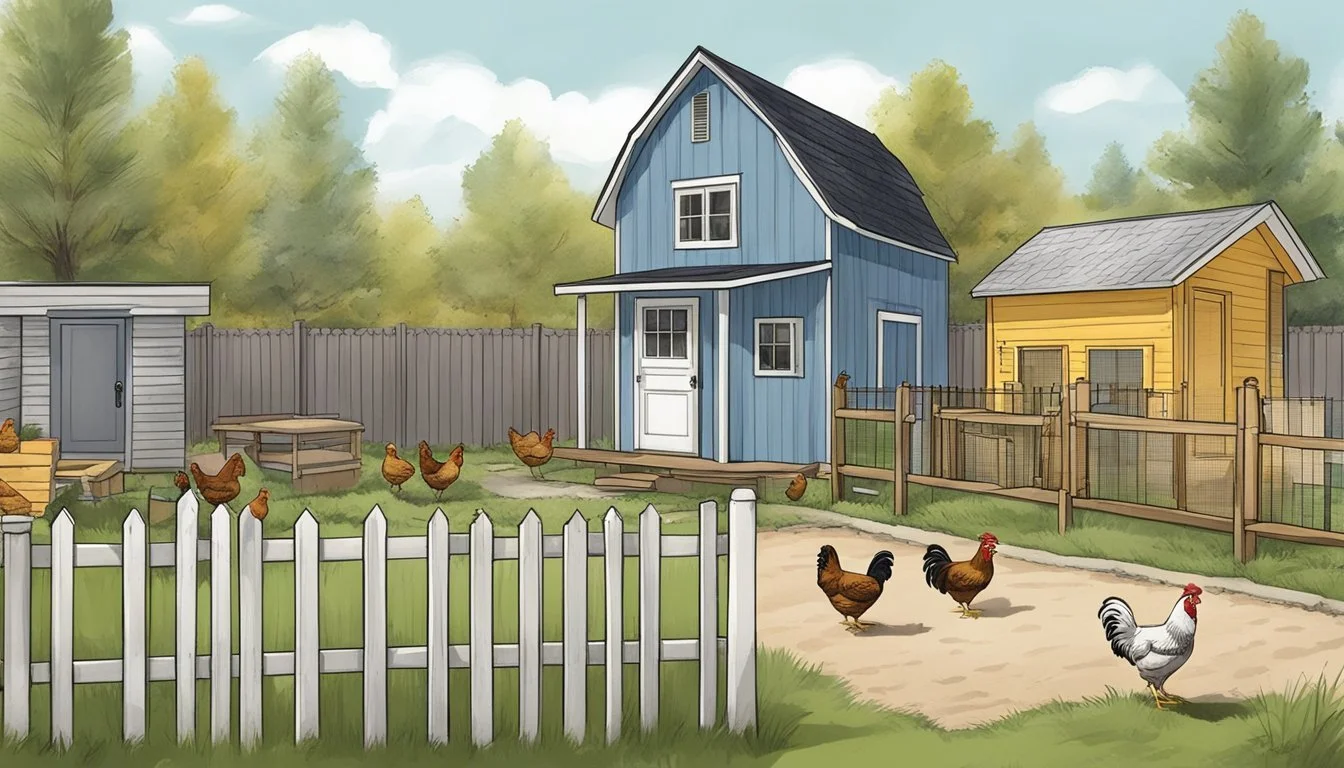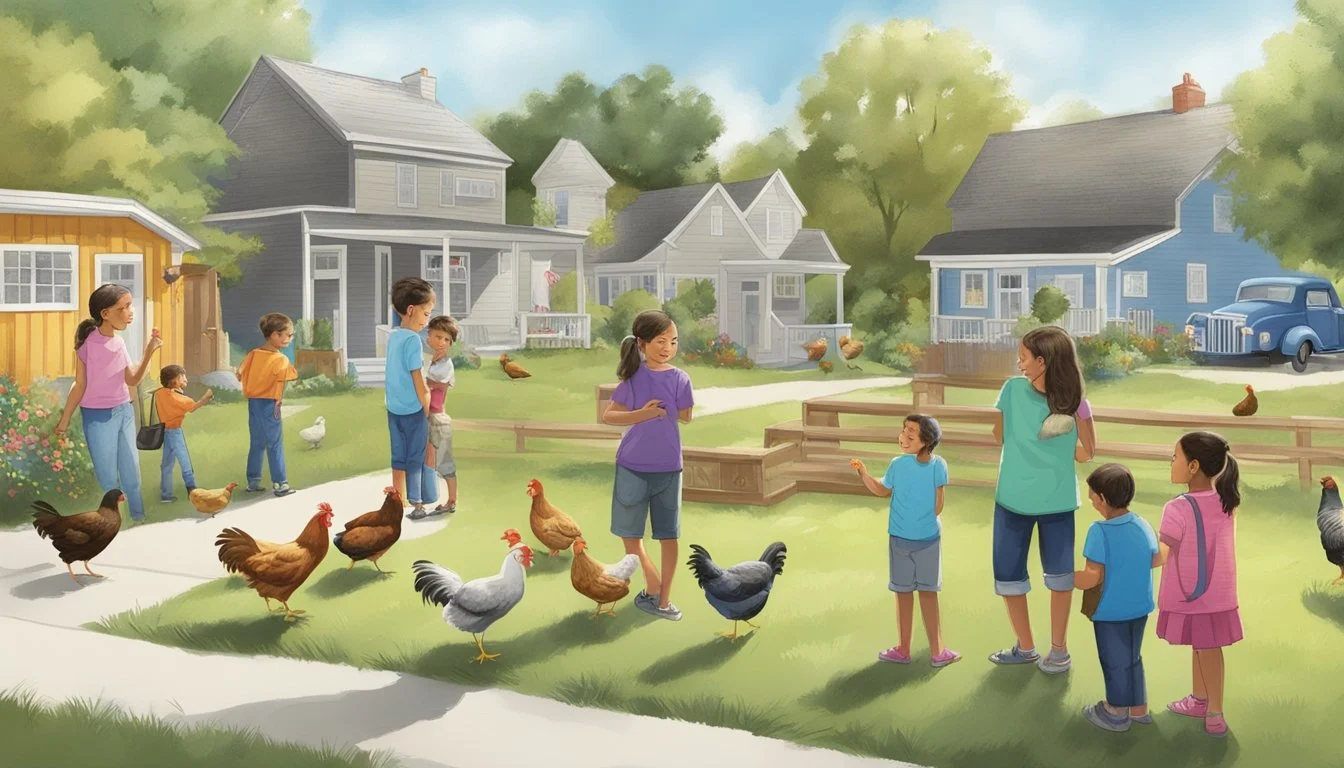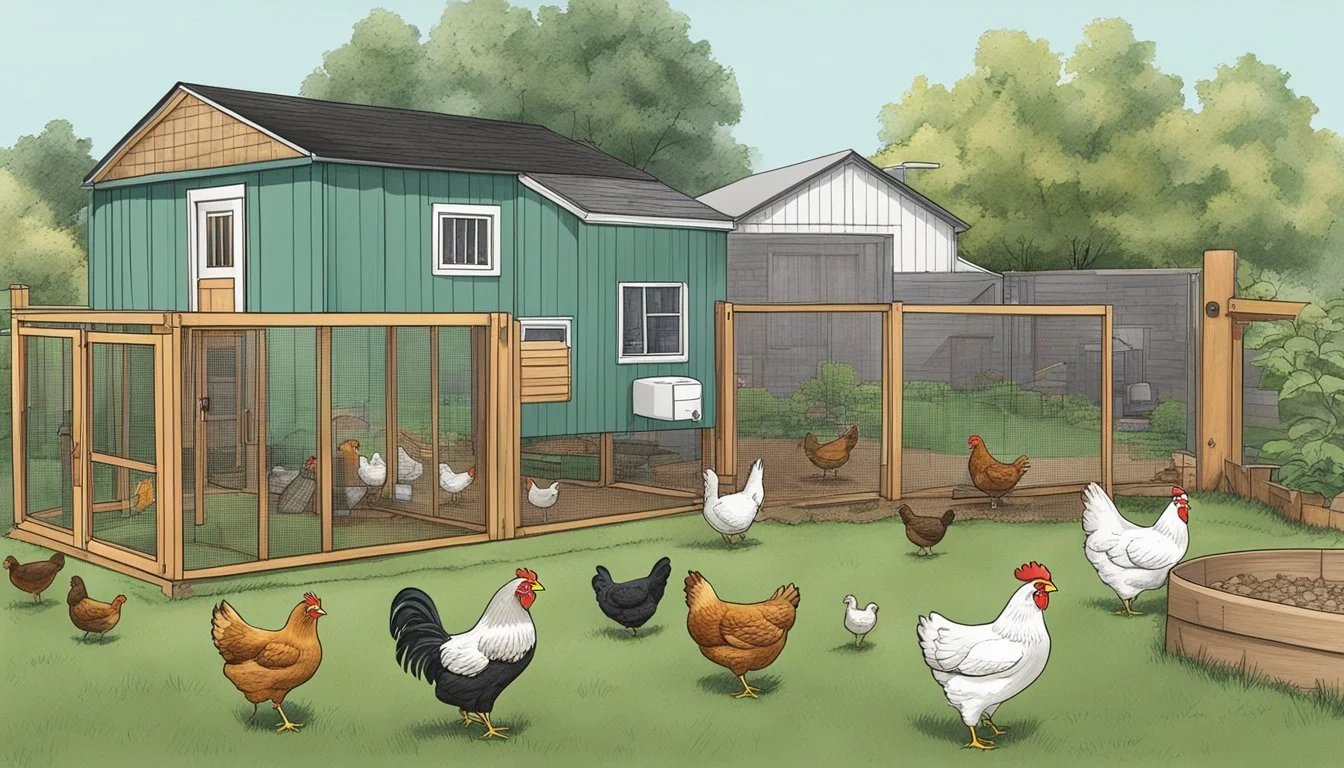Keeping Backyard Chickens in Fargo, ND
A Practical Guide for Beginners
In recent years, Fargo, North Dakota has joined the nationwide trend of urban poultry farming by allowing residents to keep backyard chickens. This move reflects a growing interest in sustainable living and local food sourcing. The city recognized the benefits of chicken keeping, including fresh eggs, natural garden fertilization, and the joy of caring for animals, which led to the amendment of the Fargo Municipal Code in May 2017. The ordinance has opened the door for citizens of Fargo to engage in this practice within their private spaces, granted they meet certain requirements.
To keep chickens in Fargo, residents must adhere to specific guidelines set forth by the city's ordinances. These regulations are in place primarily to maintain public health and safety, manage noise levels, and control odors. Among the requirements, the chickens must be housed in a secure, ventilated, and predator-resistant coop. The coop also needs to be properly maintained and placed at a minimum distance from adjacent properties to consider neighbors' rights to a peaceful and clean environment.
Fargo's approach to regulating backyard chicken keeping balances the interests of aspiring urban farmers with those of the wider community. The local government offers resources and guidelines to ensure that residents can enjoy the benefits of keeping chickens while fostering good relations with their neighbors and adhering to municipal standards. To embark on backyard chicken keeping in Fargo, one must obtain the relevant permits and familiarize oneself with the city's specific ordinances related to the care and housing of chickens.
Understanding Local Chicken Ordinances
Before keeping backyard chickens in Fargo, understanding the city's specific regulations is crucial. This includes navigating city ordinances, complying with laws, and fulfilling permit requirements to ensure a compliant coexistence within residential areas.
Navigating City Regulations
The City of Fargo maintains ordinances that permit residents to keep chickens but with certain restrictions to uphold public health and order. These local laws are detailed within the Fargo Municipal Code, which is accessible online for easy reference. Residents within the city limits should review these codes thoroughly, which can often be found on the Fargo City's official website or through direct contact with city departments concerned with land development and animal control.
Fargo Chicken Laws
The Fargo Chicken Ordinance was amended by the Fargo City Commission in May 2017, allowing backyard chickens with specific stipulations. Keeping roosters is prohibited, and the number of chickens is limited; only hens are allowed. Coops must be placed at least 25 feet from adjacent dwellings or property lines and meet size and space requirements for the chickens' well-being:
The enclosure must provide 4 square feet per bird inside the coop and 10 square feet in the run.
Coop structures should be secure, well-ventilated, and predator-resistant.
Maintenance practices should keep the coops clean and odor-free to not disturb neighbors.
The Cass Public Health department may offer more guidelines to ensure the chickens do not become a nuisance or a health hazard.
Permit Requirements for Keeping Chickens
To legally keep chickens within Fargo, residents are typically required to complete a permit application process. This may involve:
Permit Application: Submission of detailed plans for the chicken coop and run to the Planning and Development Department.
Public Hearing: In some cases, a hearing with the Planning Commission may be necessary, where residents can present their case.
Maps and Regulations Reading: Applicants should provide a site map of their property, showing the proposed location of the chicken coop and adhering to stipulated zoning regulations.
City Commission Review: Lastly, for certain permits, the Fargo City Commission may review and approve the application before any chickens can be kept.
Obtaining the correct permits ensures that residents comply with Fargo chicken laws and regulations, establishing a harmonious relationship between urban chicken enthusiasts and the wider community.
Setting Up the Chicken Coop
When setting up a chicken coop in Fargo, ND, it's crucial to adhere to local ordinances and to ensure that the design and location provide a safe, comfortable environment for the chickens.
Coop Design Principles
A well-designed chicken coop must accommodate the specific needs of the chickens while complying with the Fargo Municipal Code. The coop should provide a minimum of 3-4 square feet of space per chicken inside to prevent overcrowding. Ventilation is important, but the coop must also protect the birds from harsh North Dakota weather.
Selecting the Location
The location of a chicken coop in a Fargo backyard must respect distance requirements to avoid nuisances with neighbors. The coop should be placed at least 75 feet from any dwelling to comply with Fargo regulations. It is also wise to account for setbacks from property lines and consider accessibility for maintenance and manure management.
Essential Coop Features
Space: Minimum 3-4 square feet per chicken.
Predator proof: The coop must be secure from predators such as foxes and raccoons, which includes reinforced enclosures and burying hardware cloth to prevent digging.
Manure management: An effective system for handling manure must be in place to maintain cleanliness and reduce odors.
Height: The coop must be tall enough for the chickens to stand and for easy human access to aid in cleaning and egg collection.
To note, slaughtering and keeping of roosters within the city limits are not allowed, focusing the function of the coop on egg-laying and daily living for domestic fowl.
Caring for Your Backyard Chickens
Maintaining the health and safety of backyard chickens requires attentive care in food and nutrition, vigilant health monitoring, predator protection, and proper egg handling.
Food and Nutrition
Chickens thrive on a balanced diet that ensures their growth and egg production. A proper poultry practice includes:
Starter Feed: High in protein, it supports the growth of chicks.
Grower Feed: For adolescent chickens, slightly lower in protein.
Layer Feed: For adult hens, optimized for egg production.
Providing access to clean water and grit is also essential, as grit aids in food digestion.
Health and Well-being
Regular health checks can prevent the spread of disease and ensure a long life for the flock. Indications of a healthy chicken include:
Active behavior
Clear eyes and clean feathers
Consistent egg production
Chickens benefit from a clean coop, and their manure serves as an excellent fertilizer. Hence, it's important to regularly clean the coop to support backyard poultry well-being.
Protection from Predators
Chickens must be safeguarded from predators to ensure their survival and well-being. Key measures include:
A sturdy coop and run resistant to animals such as raccoons and foxes.
Locking mechanisms on doors and nesting boxes.
Regular inspections to repair any potential entry points for predators.
Egg Collection and Usage
Eggs should be collected daily to ensure freshness and deter predators. Following best poultry practice involves:
Storing eggs at a consistent temperature to maintain quality.
Regularly inspecting eggs for cracks or signs of contamination.
Including fresh eggs in the household diet connects families to the local food movement, emphasizing the value of good food produced at home.
Community Interaction and Considerations
In Fargo, North Dakota, keeping backyard chickens involves specific community interactions and considerations. The city's ordinances outline crucial rules, balancing individual desires for companionship and local food system education with public interest and neighborhood tranquility.
Dealing with Noise and Smell
Noise and smell are primary concerns in urban chicken keeping. Fargo's ordinance allows for keeping chickens, but it also mandates owners to manage their poultry to prevent excessive noise and odors. It lists specific measures such as proper waste disposal and coop maintenance. Virginia Beaver and Richard Beaver, residents advocating for urban chickens, emphasize the importance of cleanliness and noise control for peaceful coexistence.
Noise: Use of soundproofing materials in coops can minimize disturbance.
Smell: Regular cleanup and proper waste management prevent offensive odors.
Relations with Neighbors
Cooperative relations with neighbors are crucial. The ordinance requires potential owners to inform adjacent property owners of their intent to keep chickens.
Rules and Complaints: Residents must adhere to the number of allowed hens and coop specifications. The city addresses complaints following a set protocol.
Neighborly Conduct: Courtesy and transparency with neighbors help maintain harmonious relations.
Public Views and Participation
The public has diverse views on urban chickens which are considered during public hearings. The Fargo City Commissioners and Mayor's Office participate in these hearings to gauge community sentiment.
Minnesota vs. Fargo: Fargo's approach contrasts with neighboring Minnesota cities where backyard chicken initiatives received negative media attention.
Public Involvement: Citizens contribute to discussions, reflecting on aspects ranging from clucking companions to the impact on the local food system.
Legalities and Compliance
In Fargo, North Dakota, the practice of keeping backyard chickens is subject to city ordinances and regulations designed to ensure proper management and neighborhood coexistence.
Handling Complaints and Violations
When residents raise complaints regarding backyard chickens, the City of Fargo enforces its ordinances to resolve the issues. Violations can lead to penalties, and residents are expected to comply with specific requirements to avoid these situations. For example:
The coop must be at least 25 feet from any adjacent dwelling unit or property line.
Chickens should be kept in predator-resistant coops that are well-ventilated and maintained in a clean, odor-free condition.
Homeowners must obtain written consent if the coop is less than 75 feet from any dwelling house.
Residents can report complaints to the Planning and Development Department, which handles the enforcement of these regulations. Any reported violation of the chicken ordinance is investigated, and the city takes necessary actions to ensure compliance with the law.
Participation in Legislative Processes
The local governance of Fargo encourages participation in regulatory processes. Residents have the opportunity to engage in the following ways:
Public Hearings: Before an ordinance is passed, the Fargo City Commission holds public hearings where citizens can voice their opinions.
City Commission Meetings: Attending meetings offers a platform for public engagement with city officials, such as city commissioners and possibly the mayor.
Planning Commission: Input on proposed changes can be given during Planning Commission meetings, where issues related to urban agriculture and animal keeping are often discussed.
Councilmember Sara Watson Curry and other city officials may be involved in advocating for or against changes to the existing regulations.
The collective outcome of such participatory processes can influence the legal framework surrounding the keeping of backyard chickens within the city limits.
Educational Outreach and Advocacy
The initiative for keeping backyard chickens in Fargo, ND, emphasizes the significance of educating the public and advocating for responsible urban chicken farming practices.
Promoting Urban Chicken Farming
Education is a cornerstone of fostering a successful urban chicken farming community in Fargo. City commission members and advocates collaborate to inform residents about the benefits and responsibilities of raising chickens within city limits. This effort aims to merge a sustainable farm life ethos with urban life, ensuring that citizens appreciate both the contributions of backyard chickens to local sustainability and health code compliance.
Workshops: The city organizes workshops on best practices for coop construction, chicken care, and understanding city ordinances related to poultry.
School Programs: Local schools incorporate lessons about poultry keeping into their curriculum, focusing on life cycles, food production, and animal care.
Resource Sharing and Public Events
To strengthen community ties and knowledge sharing, Fargo encourages resource sharing and organizes public events centered on urban agriculture.
Community Coops: Shared community coop spaces allow for hands-on experience and direct education for residents considering chicken keeping.
Annual Chicken Coop Tour: This event allows prospective and current chicken keepers to learn from each other and see a variety of coop designs and management practices.
These programs not only aim to elevate the understanding and approach to backyard chicken keeping in Fargo but also seek to inspire similar initiatives in nearby cities such as Bismarck, Grand Forks, and West Fargo. Moreover, they serve as a positive example to cities like Mankato, Fergus Falls, Moorhead, and Dilworth, which may face chicken bans or are in the process of revising their urban agriculture policies.
Comparative Overview of Regional Practices
This section provides an analysis of urban chicken keeping ordinances in cities surrounding Fargo, North Dakota, and examines the role these practices play in supporting local food movements.
Chicken Keeping in Nearby Cities
Fargo, ND: In Fargo, the city amended its Municipal Code in May 2017 to permit residents to keep backyard chickens. Regulations include a minimum parcel size and explicit directives on housing and manure management.
Grand Forks, ND: Similar to Fargo, Grand Forks allows for chicken keeping within the city, provided residents meet certain conditions regarding the number of chickens and the distance from neighboring dwellings.
West Fargo, ND: In West Fargo, chicken keeping is possible but with ordinances that manage animal units based on parcel size to ensure harmony with residential spaces.
Moorhead, MN: After negative media attention in 2015, Moorhead reviewed its stance on urban chicken farming; however, the city requires adherence to strict guidelines for keeping backyard chickens.
Dilworth, MN: Dilworth residents are currently navigating the complexities of urban chicken keeping as municipal bylaws evolve to address demand and city planning.
In comparison, Minnesota cities like Mankato and Fergus Falls have localized policies that outline specific rules regarding urban chicken keeping, reflecting a diverse approach across the region.
Impact on Local Food Movements
Moorhead, Minnesota: Despite facing initial resistance, the eventual acceptance of backyard chickens in Moorhead positively influenced the local food movement by providing residents with a hyper-local source of fresh eggs.
Fargo, ND: Since the city of Fargo enabled backyard chicken keeping, it has contributed to the local food movement’s growth, connecting citizens more closely with their food sources and encouraging sustainable living practices.
Overall, the comparison of regional practices in urban chicken keeping indicates a shift towards embracing local food production, with backyard poultry acting as both a catalyst and a component of the local food movements across the Fargo region and its neighbors.









